


Testimonials
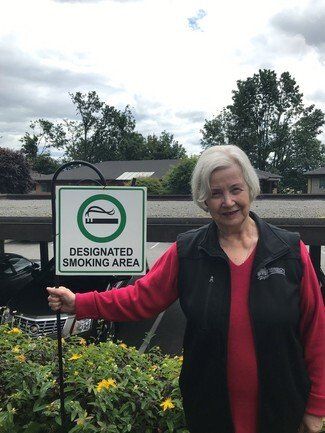
Neighbourly harmony can be a struggle when Co-op no smoking policies 'grandfather' existing tenants who smoke
Five years ago, St. Andrew’s Place, a Co-op rental housing community in Mission, BC, decided they wanted to become a 100% smoke-free. Members of the Co-op began by voting in favour of an amendment to existing rules, and inserting a no-smoking policy.
“There were lots of reasons why tenants wanted to go 100% smoke-free including people’s right to breathe clean air, the cost of refitting a unit when a smoker moves out and the increased risk of fire given our Co-op is constructed in wood,” said Diane Hammond, Manager of St. Andrew’s Place.

Neighbourly harmony can be a struggle when Co-op no smoking policies 'grandfather' existing tenants who smoke
Five years ago, St. Andrew’s Place, a Co-op rental housing community in Mission, BC, decided they wanted to become a 100% smoke-free. Members of the Co-op began by voting in favour of an amendment to existing rules, and inserting a no-smoking policy. “There were lots of reasons why tenants wanted to go 100% smoke-free including people’s right to breathe clean air, the cost of refitting a unit when a smoker moves out and the increased risk of fire given our Co-op is constructed in wood,” said Diane Hammond, Manager of St. Andrew’s Place.
“But becoming a completely smoke-free community continues to be a challenge, particularly given we have five or six people who are still allowed to smoke in their units and in a designated area on the property,” she continued.
Hammond is referring to is a ‘grandfather’ clause which members voted to include initially in their new no smoking policy.
The clause allowed rental tenants whose membership agreement predated implementation of the no smoking policy to continue smoking in their suites, patios and on a designated area of the Co-op grounds until they move out.
“But becoming a completely smoke-free community continues to be a challenge, particularly given we have five or six people who are still allowed to smoke in their units and in a designated area on the property,” she continued.
Hammond is referring to is a ‘grandfather’ clause which members voted to include initially in their new no smoking policy.
The clause allowed rental tenants whose membership agreement predated implementation of the no smoking policy to continue smoking in their suites, patios and on a designated area of the Co-op grounds until they move out.
“As manager of the Co-op I am very careful to educate all new owners about our rules including our 100% no smoking policy. But challenges emerge when a new member who smokes moves in,” she said explaining that it is against Co-op rules to discriminate against Co-op applicants based on lifestyle choices.
Given frustration among some members related to smoking rights, Hammond and her colleagues revisited their policy with help from the Co-operative Housing Federation of BC. They worked to make their policy language clearer, but for now did not revoke the right of those currently grandfathered to smoke.
The smoking of a select few continue however to be a source of aggravation for non-smokers, particularly newer members who also would like to smoke but joined the Co-op after the policy was established and are required to abide by the 100% no smoking rule.
“I feel badly when a new member sees our grandfathered smokers outside in their designated smoking area,“ she added. “It doesn’t seem fair. I find it hard not to allow them to smoke with those members in the designated area and to force them to go off the property at night in the dark seems unsafe.”
“But I constantly receive complaints from new members who worry they may end up living beside a grandfathered smoker, and should that happen not be able to protect themselves from second-hand smoke exposure,” said Hammond.
“There is little I can do as it stands. There is no sure way to prevent second-hand smoke from entering neighbouring suites. Smoke invariably drifts and finds its way through cracks in the wall, electrical outlets, plumbing pipe connections, not to mention windows,” she said.
“While I understand none of us wants to interfere with another’s lifestyle choice, I’m not sure if we were wise to grandfather existing smokers when we established our 100% no smoking policy. It seems to be a no-win situation," continued Hammond. "The grandfathered smokers aren't happy, their neighbours aren’t happy, and the new members that want to smoke aren’t happy."
Hammond feels it may necessary to revisit their policy a third time, questioning if as things are it will be possible to become a 100% smoke-free or whether it may be necessary to remove the designated smoking area and revoke the grandfathered smokers' rights.
"When some have rights others do not share it can make neighbourly harmony a real struggle,” she concluded.
“As manager of the Co-op I am very careful to educate all new owners about our rules including our 100% no smoking policy. But challenges emerge when a new member who smokes moves in,” she said explaining that it is against Co-op rules to discriminate against Co-op applicants based on lifestyle choices.
Given frustration among some members related to smoking rights, Hammond and her colleagues revisited their policy with help from the Co-operative Housing Federation of BC. They worked to make their policy language clearer, but for now did not revoke the right of those currently grandfathered to smoke.
The smoking of a select few continue however to be a source of aggravation for non-smokers, particularly newer members who also would like to smoke but joined the Co-op after the policy was established and are required to abide by the 100% no smoking rule.
“I feel badly when a new member sees our grandfathered smokers outside in their designated smoking area,“ she added. “It doesn’t seem fair. I find it hard not to allow them to smoke with those members in the designated area and to force them to go off the property at night in the dark seems unsafe.”
“But I constantly receive complaints from new members who worry they may end up living beside a grandfathered smoker, and should that happen not be able to protect themselves from second-hand smoke exposure,” said Hammond.
“There is little I can do as it stands. There is no sure way to prevent second-hand smoke from entering neighbouring suites. Smoke invariably drifts and finds its way through cracks in the wall, electrical outlets, plumbing pipe connections, not to mention windows,” she said.
“While I understand none of us wants to interfere with another’s lifestyle choice, I’m not sure if we were wise to grandfather existing smokers when we established our 100% no smoking policy. It seems to be a no-win situation," continued Hammond. "The grandfathered smokers aren't happy, their neighbours aren’t happy, and the new members that want to smoke aren’t happy."
Hammond feels it may necessary to revisit their policy a third time, questioning if as things are it will be possible to become a 100% smoke-free or whether it may be necessary to remove the designated smoking area and revoke the grandfathered smokers' rights.
"When some have rights others do not share it can make neighbourly harmony a real struggle,” she concluded.
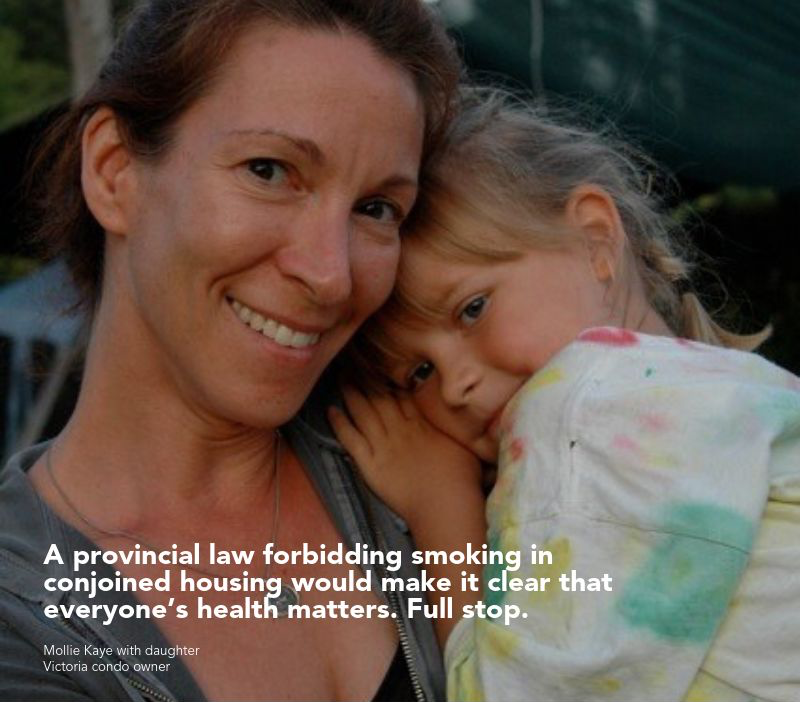
Non-smoking bylaws purview of the province, not neighbours, says Victoria condo owner
Immediately following moving into her new Victoria, BC condo in a 17-unit strata building, Mollie Kaye began renovations. Not long after, the smell of second-hand smoke became unbearable.
“I found out it was my neighbours below. I spoke with the owner, and she agreed to smoke away from her windows, but that didn’t work. Then she agreed to buy an air purifier, but unfortunately the problem only got worse,” said Kaye. “Meanwhile my daughter was getting sick, and our doctor said it was due to second-hand smoke.”

Non-smoking bylaws purview of the province, not neighbours, says Victoria condo owner
Immediately following moving into her new Victoria, BC condo in a 17-unit strata building, Mollie Kaye began renovations. Not long after, the smell of second-hand smoke became unbearable.
“I found out it was my neighbours below. I spoke with the owner, and she agreed to smoke away from her windows, but that didn’t work. Then she agreed to buy an air purifier, but unfortunately the problem only got worse,” said Kaye. “Meanwhile my daughter was getting sick, and our doctor said it was due to second-hand smoke.”
Research has shown that no ventilation system or other measure can stop the migration of second-hand smoke between units in conjoined housing. Smoke invariably travels, and finds its way to other homes—not only through windows and balconies, but lighting and plumbing fixtures, baseboards, and electrical outlets.
Research has shown that no ventilation system or other measure can stop the migration of second-hand smoke between units in conjoined housing. Smoke invariably travels, and finds its way to other homes—not only through windows and balconies, but lighting and plumbing fixtures, baseboards, and electrical outlets.
“My next option was to campaign the strata council to put forward a 100% no-smoking bylaw for an owner vote,” said Kaye. “One member of that four-person council was a smoker, and another a strong advocate for smokers’ rights. How are they going to handle an issue like this without bias?”
“I witnessed a meeting where the property manager presented what he called a “legally unenforceable” no-smoking bylaw to council which included “grandfathering” clauses that said existing smokers, like my two neighbours below, could continue smoking,” continued Kaye. “So a few other residents and I petitioned for a complete smoking ban, which led to the tabling of two non-smoking bylaws by owners.”
“At the AGM, our property manager introduced the two bylaws and characterized the more comprehensive bylaw as ‘severe,' which led to owners feeling compassion for smokers and voting for the 'grandfathering for current smokers' bylaw.”
Kaye filed a complaint under the new bylaw, and the property manager insisted “more due diligence is required,” raising the possibility that it was Kaye’s child smoking, even though the neighbours had identified themselves as the source of the second-hand smoke.
“Somehow our strata council and our property management firm seemed to feel there’s a grey area where protecting people’s health and investments are concerned.” said Kaye. “If a neighbour’s tap was overflowing and causing water damage to my unit, someone would be called in to deal with it immediately. Why do we not treat second-hand smoke the same way? Putting the burden on neighbours who serve on strata councils to enact bylaws and adjudicate situations where people’s health is threatened is unreasonable. A provincial law forbidding smoking in conjoined housing would make it clear that everyone’s health matters. Full stop.”
With her daughter getting sicker and her newly-renovated condo so smoky that friends who visited said, “I didn’t know you smoked," Kaye and her neighbour sat down and had it out. “I yelled about how sick the smoke was making my daughter, and how it was fouling my apartment and decreasing its value. I ended up breaking down crying and begged her to please stop.”
Without official censure from council, which council couldn’t quite figure out how to navigate, Kaye’s neighbours have now agreed to observe the bylaw, which says current smokers can’t smoke indoors “if the second-hand smoke is affecting other residents.” They leave the building to have their cigarettes, and while occasionally Kaye can smell smoke, her situation has vastly improved.
“Thinking about it, I just don’t understand how the BC government can continue to acknowledge that second-hand smoke is a Group A carcinogen, enact far-reaching smoking bans to protect British Columbians from tobacco and cannabis smoke exposure in public areas and workplaces, but fail to protect people where they live and sleep.”
“Half the population of BC lives in apartments, condos and townhomes – this is a huge failure on the government’s part to protect public health,” she continued.
BC’s Tobacco and Vapour Products Control Regulation sets a six-metre smoke-free zone around all doorways, air intakes and open windows to any public and work places in BC, in which no one can stand and use tobacco, cannabis or vapour products.
“If our building were a public or work place, then every time my neighbours smoked, they would be automatically violating this law. Effectively, they’re about two metres away from us, and their smoke is migrating directly into my living space where we’re forced to breathe in cancer-causing chemicals for hours a day,” Kaye added.
“My next option was to campaign the strata council to put forward a 100% no-smoking bylaw for an owner vote,” said Kaye. “One member of that four-person council was a smoker, and another a strong advocate for smokers’ rights. How are they going to handle an issue like this without bias?”
“I witnessed a meeting where the property manager presented what he called a “legally unenforceable” no-smoking bylaw to council which included “grandfathering” clauses that said existing smokers, like my two neighbours below, could continue smoking,” continued Kaye. “So a few other residents and I petitioned for a complete smoking ban, which led to the tabling of two non-smoking bylaws by owners.”
“At the AGM, our property manager introduced the two bylaws and characterized the more comprehensive bylaw as ‘severe,' which led to owners feeling compassion for smokers and voting for the 'grandfathering for current smokers' bylaw.”
Kaye filed a complaint under the new bylaw, and the property manager insisted “more due diligence is required,” raising the possibility that it was Kaye’s child smoking, even though the neighbours had identified themselves as the source of the second-hand smoke.
“Somehow our strata council and our property management firm seemed to feel there’s a grey area where protecting people’s health and investments are concerned.” said Kaye. “If a neighbour’s tap was overflowing and causing water damage to my unit, someone would be called in to deal with it immediately. Why do we not treat second-hand smoke the same way? Putting the burden on neighbours who serve on strata councils to enact bylaws and adjudicate situations where people’s health is threatened is unreasonable. A provincial law forbidding smoking in conjoined housing would make it clear that everyone’s health matters. Full stop.”
With her daughter getting sicker and her newly-renovated condo so smoky that friends who visited said, “I didn’t know you smoked," Kaye and her neighbour sat down and had it out. “I yelled about how sick the smoke was making my daughter, and how it was fouling my apartment and decreasing its value. I ended up breaking down crying and begged her to please stop.”
Without official censure from council, which council couldn’t quite figure out how to navigate, Kaye’s neighbours have now agreed to observe the bylaw, which says current smokers can’t smoke indoors “if the second-hand smoke is affecting other residents.” They leave the building to have their cigarettes, and while occasionally Kaye can smell smoke, her situation has vastly improved.
“Thinking about it, I just don’t understand how the BC government can continue to acknowledge that second-hand smoke is a Group A carcinogen, enact far-reaching smoking bans to protect British Columbians from tobacco and cannabis smoke exposure in public areas and workplaces, but fail to protect people where they live and sleep.”
“Half the population of BC lives in apartments, condos and townhomes – this is a huge failure on the government’s part to protect public health,” she continued.
BC’s Tobacco and Vapour Products Control Regulation sets a six-metre smoke-free zone around all doorways, air intakes and open windows to any public and work places in BC, in which no one can stand and use tobacco, cannabis or vapour products.
“If our building were a public or work place, then every time my neighbours smoked, they would be automatically violating this law. Effectively, they’re about two metres away from us, and their smoke is migrating directly into my living space where we’re forced to breathe in cancer-causing chemicals for hours a day,” Kaye added.
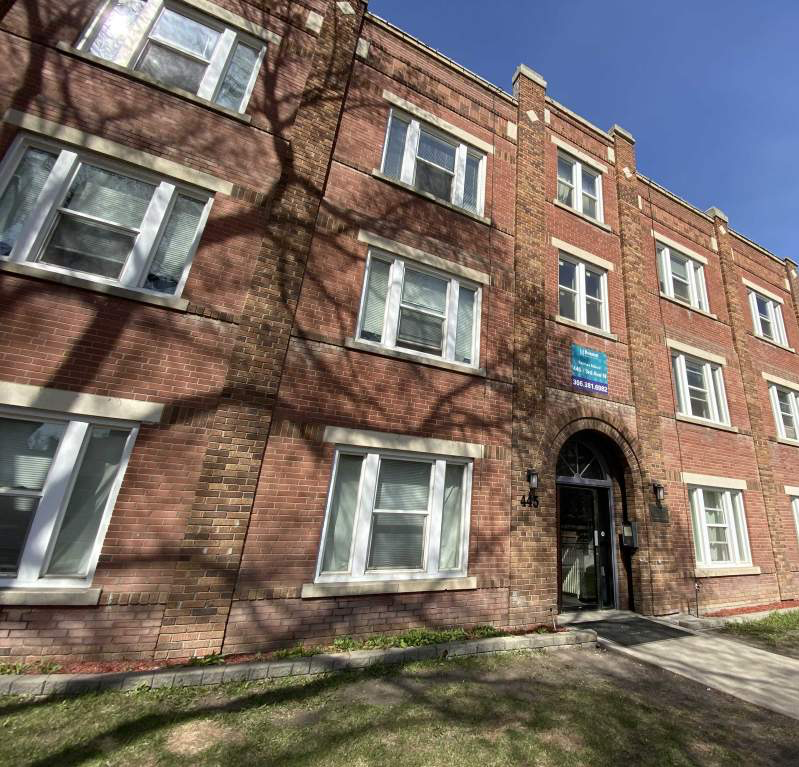
An apartment rental company with more than 11,000 units in Western Canada says it will ban all types of smoking in its units and on balconies starting this fall.
The news comes a couple weeks after the Saskatchewan Housing Corporation issued a similar notice, and just three months out from when marijuana will be legalized across Canada.

An apartment rental company with more than 11,000 units in Western Canada says it will ban all types of smoking in its units and on balconies starting this fall.
The news comes a couple weeks after the Saskatchewan Housing Corporation issued a similar notice, and just three months out from when marijuana will be legalized across Canada.
"Our buildings will be no-smoking buildings for both cigarette smoke and marijuana," confirmed Sheena Keslick, the vice-president of operations for Mainstreet Equity Corp., on Thursday.
The smoking ban will also cover medical marijuana and vaping and will extend to the patios attached to apartments, she added. Designated smoking areas will be set up outside buildings.
"Our buildings will be no-smoking buildings for both cigarette smoke and marijuana," confirmed Sheena Keslick, the vice-president of operations for Mainstreet Equity Corp., on Thursday.
The smoking ban will also cover medical marijuana and vaping and will extend to the patios attached to apartments, she added. Designated smoking areas will be set up outside buildings.
The Saskatchewan Landlord Association says Mainstreet is not alone in its decision. The association held a meeting earlier this year attended by 175 Regina and Saskatoon landlords.
"I'd say 80 per cent of those two groups were going towards a non smoking [policy]," said Chanda Lockhart, the association's executive officer.
"They've asked, 'What can I do and how can I protect myself?' And the best protection is to make their buildings non-smoking because cannabis can cause damages. They don't want the growth in their building. They don't want the smell. They don't want the risk of insurance issues, fire hazards, unwanted company, etc."
'Majority of our customers do not smoke'
Mainstreet, a Calgary-based company that markets itself to families and students, owned 288 properties with a total of 11,213 rental units as of March 31, according to an earnings report. Cities it has buildings in include Calgary, Edmonton, Regina, Saskatoon, Abbotsford, B.C., and Surrey.
The company has about 6,600 units in Alberta, spread between Calgary, Edmonton and Lethbridge.
Mainstreet will begin notifying all its customers about the smoking ban within the next week or so, Keslick said. She said the decision is about health and safety for residents.
"I think that smoking has become almost a thing that's almost become unacceptable in a lot of different areas," she said.
"Our buildings are all family friendly. We have to consider all of our customers and I would say that the majority of our customers do not smoke."
Keslick added medical marijuana will also be banned.
Growing also banned
The company is also banning growing marijuana in apartments.
Keslick said the decision is about protecting the company's assets.
"It has different effects to the building and premise," she said. "Whether it's electricity, extra usage of electricity, humidity, moisture, all those things can affect our structure. It can also affect all of our other customers as well."
The Saskatchewan Landlord Association says Mainstreet is not alone in its decision. The association held a meeting earlier this year attended by 175 Regina and Saskatoon landlords.
"I'd say 80 per cent of those two groups were going towards a non smoking [policy]," said Chanda Lockhart, the association's executive officer.
"They've asked, 'What can I do and how can I protect myself?' And the best protection is to make their buildings non-smoking because cannabis can cause damages. They don't want the growth in their building. They don't want the smell. They don't want the risk of insurance issues, fire hazards, unwanted company, etc."
'Majority of our customers do not smoke'
Mainstreet, a Calgary-based company that markets itself to families and students, owned 288 properties with a total of 11,213 rental units as of March 31, according to an earnings report. Cities it has buildings in include Calgary, Edmonton, Regina, Saskatoon, Abbotsford, B.C., and Surrey.
The company has about 6,600 units in Alberta, spread between Calgary, Edmonton and Lethbridge. Mainstreet will begin notifying all its customers about the smoking ban within the next week or so, Keslick said. She said the decision is about health and safety for residents.
"I think that smoking has become almost a thing that's almost become unacceptable in a lot of different areas," she said. "Our buildings are all family friendly. We have to consider all of our customers and I would say that the majority of our customers do not smoke." Keslick added medical marijuana will also be banned.
Growing also banned
The company is also banning growing marijuana in apartments. Keslick said the decision is about protecting the company's assets. "It has different effects to the building and premise," she said. "Whether it's electricity, extra usage of electricity, humidity, moisture, all those things can affect our structure. It can also affect all of our other customers as well."

Interview - Should no-smoking rules be integral to rental lease agreements
Property management firm Vancouver Management Ltd has managed rental, strata and social housing properties in Metro Vancouver for more than 50 years. For some time now they have made no smoking policies a staple of all its lease agreements with rental building tenants – be it those living in market rental or social housing.
It’s a no-brainer says property manager Tyler Davis.
Property management firm Vancouver Management Ltd has managed rental, strata and social housing properties in Metro Vancouver for more than 50 years. For some time now they have made no smoking policies a staple of all its lease agreements with rental building tenants – be it those living in market rental or social housing.
To learn more we talked to Vancouver Management property manager Tyler Davis. He believes a 100% no-smoking policy should be integral to any rental lease agreement these days.

Interview - Should no-smoking rules be integral to rental lease agreements
Property management firm Vancouver Management Ltd has managed rental, strata and social housing properties in Metro Vancouver for more than 50 years. For some time now they have made no smoking policies a staple of all its lease agreements with rental building tenants – be it those living in market rental or social housing.
Property management firm Vancouver Management Ltd has managed rental, strata and social housing properties in Metro Vancouver for more than 50 years. For some time now they have made no smoking policies a staple of all its lease agreements with rental building tenants – be it those living in market rental or social housing.
To learn more we talked to Vancouver Management property manager Tyler Davis. He believes a 100% no-smoking policy should be integral to any rental lease agreement these days.
Why include a no-smoking policy in all its rental agreements?
It’s a no-brainer. At one time, second-hand smoke complaints were a source of a lot of grief between neighbours living in properties we managed. They ate up huge amounts of our time, and frankly second-hand smoke issues are not easy to resolve. The process required to document, validate and even attempt to fix a smoking problem is cumbersome. The clean-up costs when turning over an apartment where a smoker has resided are just too high, and naturally rental building owners are supportive of any reasonable effort to minimize costs.
Why include a no-smoking policy in all its rental agreements?
It’s a no-brainer. At one time, second-hand smoke complaints were a source of a lot of grief between neighbours living in properties we managed. They ate up huge amounts of our time, and frankly second-hand smoke issues are not easy to resolve. The process required to document, validate and even attempt to fix a smoking problem is cumbersome. The clean-up costs when turning over an apartment where a smoker has resided are just too high, and naturally rental building owners are supportive of any reasonable effort to minimize costs.
We have so many other management priorities when running a building. We decided it was simpler to ban smoking outright, and for a long time now, include no-smoking policies in all agreements for rental properties we manage. This includes prohibiting smoking in both inside units and balconies and patios.
Do you think tenants prefer smoke-free buildings?
I believe so, yes. Smoking traditional cigarettes has trended out in my opinion. Fewer and fewer smoke, and fewer and fewer people tolerate second-hand smoke. We’ve never had any pushback from new tenants renting properties when we tell them no smoking is allowed.
Does the legalization of marijuana concern you?
It concerns tenants more. We insist upon a no-smoking policy so it’s not a problem. And the government is helping in that regard. Once marijuana smoking becomes legal, all buildings with no-smoking policies within leases are grandfathered to include marijuana smoking AND vaping in fact. This means anyone who signed an agreement banning tobacco prior to the new cannabis control legislation coming into effect, is also banned from smoking marijuana or vaping. This change is retroactive to all tenancies entered into before the cannabis control legislation becomes law.
What changes when marijuana becomes legal?
Any agreement entered into after the cannabis control and Licensing Act becomes law must include a prohibition that specifically mentions cannabis or is a broad prohibition which bans the smoking and vaping of all combustible materials.] Property managers need to make sure their lease agreements spell out no-smoking rules clearly. But we’re on top of that. In all our new tenant lease agreements we’ve already changed our agreement to say marijuana smoking and vaping is banned too. We’re also banning the growth of marijuana plants – and the use of other combustibles, like incense. Incense can emit a strong odour too when burned, and it’s just easier to ask people not to use it. Again, we’ve already started using the agreement with new tenants and have experienced no pushback.
As property managers we have a duty to help ensure the quiet enjoyment of the increasing number of people who are living side by side, and second-hand smoke, in whatever form, has so often been a source of contention in the past, we feel it’s better to shut down the potential for complaints before they start.
How about vaping? Have you had any complaints?
No, not yet. But with patio season starting who knows. The emissions from vaporizers can be pretty smelly too! I’m not sure how much we know about the health effects, and I think marijuana smells stronger, but I’ve witnessed the huge plumes of vapour that can come out of those things. So we’ll see. At least we have the power to do something about it if it is a problem?
Are you worried about the rights of tenants who rely on marijuana use for medical purposes?
Not really. There are other ways to use marijuana for medicinal purposes, apart from smoking it, such as edibles. Our no-smoking policy is about protecting the quiet enjoyment of tenants, and not a judgement about anyone’s choice to smoke or use marijuana.
You manage social housing properties. Is smoking more of a problem in social housing situations?
In my 20+ years in property management, I’ve managed a significant number of social housing units. It’s true in social housing tenant turnover is low. Tenants are loathe to give up subsidized housing as it is really hard to secure in the first place. And, under current laws, people living in subsidized housing units who signed rental agreements long ago which allowed smoking, are ‘grandfathered’ or able to continue smoking until they vacate their unit. But each time one of our social housing units frees up, and we assign a new tenant, their lease includes a no-smoking policy. It will take time, but eventually the social housing properties we manage will become smoke-free. To speed up the process in social housing, would require a change to grandfathering rules under the Residential Tenancy Act.
Do tenants respect no smoking rules?
By and large yes. Sure, there are always one or two people in most of our buildings who ignore the rules. But generally, we have very, very few second-hand smoke problems. And when we do, the neighours of the person who smokes end up helping us enforce existing rules!
We have so many other management priorities when running a building. We decided it was simpler to ban smoking outright, and for a long time now, include no-smoking policies in all agreements for rental properties we manage. This includes prohibiting smoking in both inside units and balconies and patios.
Do you think tenants prefer smoke-free buildings?
I believe so, yes. Smoking traditional cigarettes has trended out in my opinion. Fewer and fewer smoke, and fewer and fewer people tolerate second-hand smoke. We’ve never had any pushback from new tenants renting properties when we tell them no smoking is allowed.
Does the legalization of marijuana concern you?
It concerns tenants more. We insist upon a no-smoking policy so it’s not a problem. And the government is helping in that regard. Once marijuana smoking becomes legal, all buildings with no-smoking policies within leases are grandfathered to include marijuana smoking AND vaping in fact. This means anyone who signed an agreement banning tobacco prior to the new cannabis control legislation coming into effect, is also banned from smoking marijuana or vaping. This change is retroactive to all tenancies entered into before the cannabis control legislation becomes law.
What changes when marijuana becomes legal?
Any agreement entered into after the cannabis control and Licensing Act becomes law must include a prohibition that specifically mentions cannabis or is a broad prohibition which bans the smoking and vaping of all combustible materials.] Property managers need to make sure their lease agreements spell out no-smoking rules clearly. But we’re on top of that. In all our new tenant lease agreements we’ve already changed our agreement to say marijuana smoking and vaping is banned too. We’re also banning the growth of marijuana plants – and the use of other combustibles, like incense. Incense can emit a strong odour too when burned, and it’s just easier to ask people not to use it. Again, we’ve already started using the agreement with new tenants and have experienced no pushback.
As property managers we have a duty to help ensure the quiet enjoyment of the increasing number of people who are living side by side, and second-hand smoke, in whatever form, has so often been a source of contention in the past, we feel it’s better to shut down the potential for complaints before they start.
How about vaping? Have you had any complaints?
No, not yet. But with patio season starting who knows. The emissions from vaporizers can be pretty smelly too! I’m not sure how much we know about the health effects, and I think marijuana smells stronger, but I’ve witnessed the huge plumes of vapour that can come out of those things. So we’ll see. At least we have the power to do something about it if it is a problem?
Are you worried about the rights of tenants who rely on marijuana use for medical purposes?
Not really. There are other ways to use marijuana for medicinal purposes, apart from smoking it, such as edibles. Our no-smoking policy is about protecting the quiet enjoyment of tenants, and not a judgement about anyone’s choice to smoke or use marijuana.
You manage social housing properties. Is smoking more of a problem in social housing situations?
In my 20+ years in property management, I’ve managed a significant number of social housing units. It’s true in social housing tenant turnover is low. Tenants are loathe to give up subsidized housing as it is really hard to secure in the first place. And, under current laws, people living in subsidized housing units who signed rental agreements long ago which allowed smoking, are ‘grandfathered’ or able to continue smoking until they vacate their unit. But each time one of our social housing units frees up, and we assign a new tenant, their lease includes a no-smoking policy. It will take time, but eventually the social housing properties we manage will become smoke-free. To speed up the process in social housing, would require a change to grandfathering rules under the Residential Tenancy Act.
Do tenants respect no smoking rules?
By and large yes. Sure, there are always one or two people in most of our buildings who ignore the rules. But generally, we have very, very few second-hand smoke problems. And when we do, the neighours of the person who smokes end up helping us enforce existing rules!
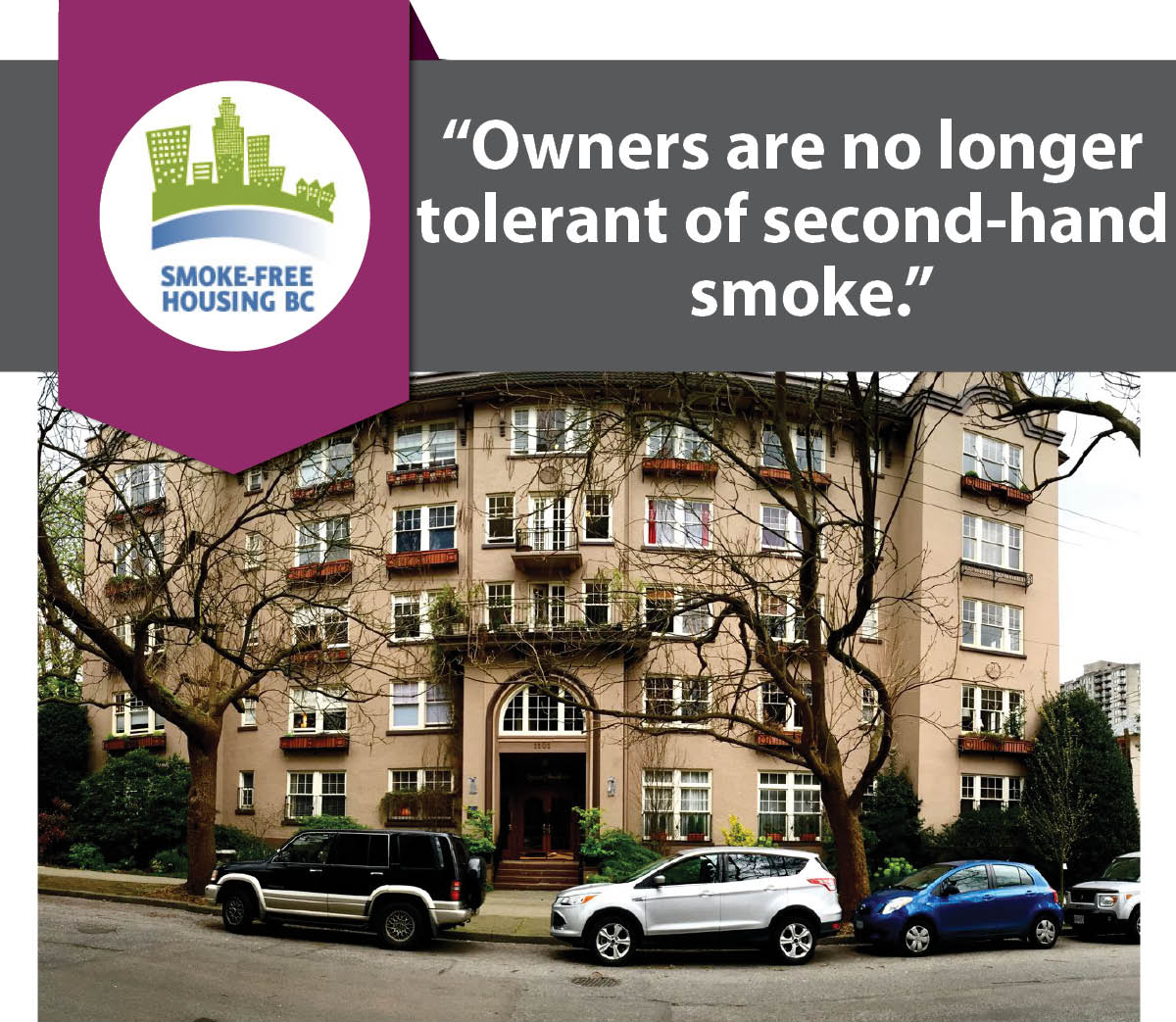
Vancouver condo building outgrows its smoking past
Andrea Sharkey's Story
“When the 1928 building was first established, people no doubt smoked freely inside and out for decades. Today it’s a whole different story. Owners are no longer as tolerant of second‐hand smoke,” said Andrea Sharkey, Strata Manager for FirstService Residential Property Management.

Vancouver condo building outgrows its smoking past
Andrea Sharkey's Story
“When the 1928 building was first established, people no doubt smoked freely inside and out for decades. Today it’s a whole different story. Owners are no longer as tolerant of second‐hand smoke,” said Andrea Sharkey, Strata Manager for FirstService Residential Property Management.
Sharkey is speaking about the Queen Charlotte, a strata‐titled heritage building in Vancouver’s West End, and the strata owners’ choice to go 100 percent smoke‐free.
Sharkey is speaking about the Queen Charlotte, a strata‐titled heritage building in Vancouver’s West End, and the strata owners’ choice to go 100 percent smoke‐free.
“Council was getting complaints about second‐hand smoke, and efforts to deal with the problem short of banning smoking altogether were unsuccessful, because the smoke travelled through the building’s heating and ventilation system, and even drifted out the windows of the suite in question and into the units above.“
After efforts to confine the smoke to the smoker’s unit proved ineffective, a year ago the building’s Strata Council held a Special General Meeting to vote on whether to ban smoking altogether – on the building grounds, all common areas, and inside owners’ and the rental suite. The 100% no smoking bylaw required a 3/4 vote and passed easily.
Today the Queen Charlotte has been officially smoke‐free for over a year.
Sharkey confirms that even one smoker living in the complex can have a huge impact on the health and well‐being of many other residents in the building. The decision to go smoke‐free was primarily an issue of health and safety for all residents, but was also an economic issue, as dealing with resident complaints was taking up a lot of management’s time and resources.
Health advocates including the BC Lung Association and the Heart and Stroke Foundationare keen to move the issue forward and help increase the availability of smoke‐free housing options in apartments and condos.
“We regularly receive calls from property managers and residents looking for help to address second‐hand smoke,” says Sharon Hammond, Manager of www.smokefreehousingbc.ca a valuable resource for Strata Corporations exploring the idea of going smoke‐free.
“Not everyone knows it’s legal to adopt a 100% no smoking bylaw. We want to promote smoke‐free building success stories, like the Queen Charlotte’s, to educate strata corporations on the growing number of buildings becoming 100% smoke‐free.
Plus, we want to get the word out that while smoke‐free buildings protect residents from a known health hazard, they can also increase marketability, reduce conflicts among residents, protect against litigation and human rights complaints, save money on maintenance and eliminate a leading cause of residential fires.”
“It’s win‐win. What’s good for resident health is also good for the bottom line.”
“Council was getting complaints about second‐hand smoke, and efforts to deal with the problem short of banning smoking altogether were unsuccessful, because the smoke travelled through the building’s heating and ventilation system, and even drifted out the windows of the suite in question and into the units above.“
After efforts to confine the smoke to the smoker’s unit proved ineffective, a year ago the building’s Strata Council held a Special General Meeting to vote on whether to ban smoking altogether – on the building grounds, all common areas, and inside owners’ and the rental suite. The 100% no smoking bylaw required a 3/4 vote and passed easily.
Today the Queen Charlotte has been officially smoke‐free for over a year.
Sharkey confirms that even one smoker living in the complex can have a huge impact on the health and well‐being of many other residents in the building. The decision to go smoke‐free was primarily an issue of health and safety for all residents, but was also an economic issue, as dealing with resident complaints was taking up a lot of management’s time and resources.
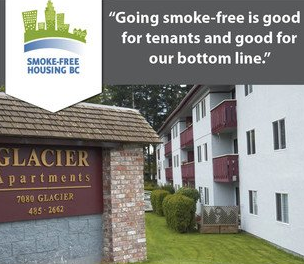
Powell River rental caretakers converting their building to 100% smoke-free starting January 1, 2016
Lyndell Klassen and Paul Leblanc's Story
“People kept complaining about the smoke, so we’re going to be officially smoke-free starting January first,” started Lyndell Klassen and Paul Leblanc, caretakers for a local apartment building in Powell River.

Powell River rental caretakers converting their building to 100% smoke-free starting January 1, 2016
Lyndell Klassen and Paul Leblanc's Story
“People kept complaining about the smoke, so we’re going to be officially smoke-free starting January first,” started Lyndell Klassen and Paul Leblanc, caretakers for a local apartment building in Powell River.
Klassen and Leblanc have been receiving complaints from various tenants about the smoke-smell lingering in the hallways. “We have both cigarette and marijuana smokers; the smells linger and bother a lot of people,” explained Leblanc.
Klassen and Leblanc have been receiving complaints from various tenants about the smoke-smell lingering in the hallways. “We have both cigarette and marijuana smokers; the smells linger and bother a lot of people,” explained Leblanc.
Coastal Health Authority became involved and worked with the building owners to evict a tenant who wasn’t willing to abide with the no smoking regulations. “We had many meetings and discussed various options, but it came down to doing what was best for the majority of our tenants. In this case, that meant evicting the tenant who was in violation of our no-smoke policy,” said Leblanc.
There are currently 15 smokers out of the apartment building of 58, many who have been living in their units for multiple years.
“We’ve been putting up signs and notifying people about the changes to become a smoke-free building starting January first,” continued Leblanc. “Of course we will have to grandfather in some tenants who smoke, but we’ll do our best to encourage them to smoke elsewhere and ensure all new tenants sign on to our smoke-free policy. In the long run it will save a lot of headache and hassles in the future to have this stipulation in place before more issues arise.”
According to health advocates the BC Lung Association and the Heart and Stroke Foundation, smoke-free apartments are gaining momentum as more and more families want to live in 100% smoke-free environments. In fact, a 2013 Angus Reid survey of 833 residents living in multi-unit dwellings, confirmed that nearly two thirds of residents prefer to live in a building that is completely smoke-free.
Hugh Turner, a landlord in Victoria who owns multiple apartment buildings, switched all his buildings to smoke-free status six years ago when he learned it was legal to do. “It’s good for tenants and it’s good for our bottom line. Plus it was easy to do.” Like many landlords in BC, Turner recognized the huge demand for smoke-free housing, as well as the obvious cost savings, and hasn’t looked back.
Proactive landlords who have made the switch to smoke-free buildings are simply finding the benefits too great to ignore:
- Saves you money by reducing cleaning, repair and maintenance costs.
- Reduces complaints from tenants: 50% of residents living in multi-unit dwellings have experienced smoke infiltrating their homes from neighbouring units.
- Reduces the risk of fires: Tobacco materials are the #1 source of fatal residential fires in BC.
- Offers a safer, healthier and cleaner indoor environment for residents.
- Protects against litigation by tenants seeking relief from disabilities aggravated by second-hand smoke.
- Is non-discriminatory. They don’t exclude people who smoke, but simply require that they comply with the no-smoking policy.
- A greener path to a greener building. For LEED certification, buildings must have a no-smoking policy.
“British Columbians are used to smoke-free environments at work, in restaurants and bars, in public places, as well as outdoor parks and beaches. And we want the same protections in our homes.” said Scott McDonald, CEO of the BC Lung Association.
Once landlords go smoke-free they’re hooked – on the benefits that is. “It’s one of the easiest things you can do to protect your investment, reduce fires and clean-up costs, protect resident health, and reduce complaints of second-hand smoke from frustrated tenants.” says Tyler Davis, Property Manager, Vancouver Management Ltd.
According to the Canadian Tobacco, Alcohol and Drugs Survey, the BC Smoking rate is 11.4 percent, the lowest rate in the country. If landlords are concerned about vacancies, look to this growing population of prospective tenants who view smoke-free homes as an attractive and non-negotiable amenity.
Coastal Health Authority became involved and worked with the building owners to evict a tenant who wasn’t willing to abide with the no smoking regulations. “We had many meetings and discussed various options, but it came down to doing what was best for the majority of our tenants. In this case, that meant evicting the tenant who was in violation of our no-smoke policy,” said Leblanc.
There are currently 15 smokers out of the apartment building of 58, many who have been living in their units for multiple years.
“We’ve been putting up signs and notifying people about the changes to become a smoke-free building starting January first,” continued Leblanc. “Of course we will have to grandfather in some tenants who smoke, but we’ll do our best to encourage them to smoke elsewhere and ensure all new tenants sign on to our smoke-free policy. In the long run it will save a lot of headache and hassles in the future to have this stipulation in place before more issues arise.”
According to health advocates, smoke-free apartments are gaining momentum as more and more families want to live in 100% smoke-free environments. In fact, a 2013 Angus Reid survey of 833 residents living in multi-unit dwellings, confirmed that nearly two thirds of residents prefer to live in a building that is completely smoke-free.
Hugh Turner, a landlord in Victoria who owns multiple apartment buildings, switched all his buildings to smoke-free status six years ago when he learned it was legal to do. “It’s good for tenants and it’s good for our bottom line. Plus it was easy to do.” Like many landlords in BC, Turner recognized the huge demand for smoke-free housing, as well as the obvious cost savings, and hasn’t looked back.
Proactive landlords who have made the switch to smoke-free buildings are simply finding the benefits too great to ignore:
- Saves you money by reducing cleaning, repair and maintenance costs.
- Reduces complaints from tenants: 50% of residents living in multi-unit dwellings have experienced smoke infiltrating their homes from neighbouring units.
- Reduces the risk of fires: Tobacco materials are the #1 source of fatal residential fires in BC.
- Offers a safer, healthier and cleaner indoor environment for residents.
- Protects against litigation by tenants seeking relief from disabilities aggravated by second-hand smoke.
- Is non-discriminatory. They don’t exclude people who smoke, but simply require that they comply with the no-smoking policy.
- A greener path to a greener building. For LEED certification, buildings must have a no-smoking policy.
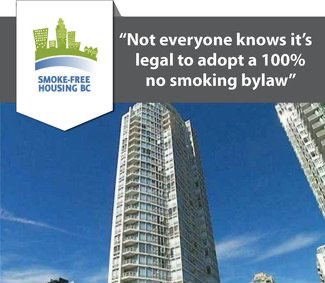
Condo owner takes preventative action now to avoid headaches later
Bunny Porteus's Story
“The owners were smart,” says Bunny Porteous, Senior Strata Manager for FirstService Residential Property Management. “The Strata Council took preventative action now to avoid problems later.”

Condo owner takes preventative action now to avoid headaches later
Bunny Porteus's Story
“The owners were smart,” says Bunny Porteous, Senior Strata Manager for FirstService Residential Property Management. “The Strata Council took preventative action now to avoid problems later.”
Porteus is referring to the Peninsula, a high‐end waterfront condominium building in Yaletown managed by FirstService Residential. The moment second‐hand smoke problems began, Council got proactive.
Porteus is referring to the Peninsula, a high‐end waterfront condominium building in Yaletown managed by FirstService Residential. The moment second‐hand smoke problems began, Council got proactive.
“When the Strata Council first asked for help implementing a no‐smoking bylaw, I suggested they propose a smoking ban on limited common property (balconies), but they decided to propose a ban that prohibited smoking throughout the entire building and grounds, homeowners’ suites and balconies included,” continued Porteous. “Council sensed owners would be supportive and they were right. Seventy‐five percent voted yes.”
Porteus suggests more buildings should follow the Peninsula’s lead and seek support for a similar bylaw before smoking complaints start. A 10‐year veteran of the strata management business, she confirms smoking issues can eat up a lot of time and short of a no‐smoking policy, are seldom easy to resolve.
“An ounce of prevention is worth a pound of cure. If a Council believes ownership would be supportive of a 100% no‐smoking bylaw, I say go for it,” she continued. “Besides avoiding smoking complaint headaches, a no‐smoking bylaw reduces risk of fire, clean‐up costs and I expect could make units easier to sell.”
Health advocates including the BC Lung Association and the Heart and Stroke Foundation are keen to move the issue forward and help increase the availability of smoke‐free housing options in apartments and condos.
“We regularly receive calls from property managers and residents looking for help to address second‐hand smoke,” says Sharon Hammond, Manager of SmokeFreeHousingBC.ca a valuable resource for Strata Corporations exploring the idea of going smoke‐free.
“Not everyone knows it’s legal to adopt a 100% no smoking bylaw. We want to promote smoke‐free building success stories, like the Peninsula’s, to educate strata corporations on the growing number of buildings becoming 100% smoke‐free."
"Plus, we want to get the word out that while smoke‐free buildings protect residents from a known health hazard, they can also increase marketability, reduce conflicts among residents, protect against litigation and human rights complaints, save money on maintenance and eliminate a leading cause of residential fires.”
“It’s win‐win. What’s good for resident health is also good for the bottom line.”
“When the Strata Council first asked for help implementing a no‐smoking bylaw, I suggested they propose a smoking ban on limited common property (balconies), but they decided to propose a ban that prohibited smoking throughout the entire building and grounds, homeowners’ suites and balconies included,” continued Porteous. “Council sensed owners would be supportive and they were right. Seventy‐five percent voted yes.”
Porteus suggests more buildings should follow the Peninsula’s lead and seek support for a similar bylaw before smoking complaints start. A 10‐year veteran of the strata management business, she confirms smoking issues can eat up a lot of time and short of a no‐smoking policy, are seldom easy to resolve.
“An ounce of prevention is worth a pound of cure. If a Council believes ownership would be supportive of a 100% no‐smoking bylaw, I say go for it,” she continued. “Besides avoiding smoking complaint headaches, a no‐smoking bylaw reduces risk of fire, clean‐up costs and I expect could make units easier to sell.”
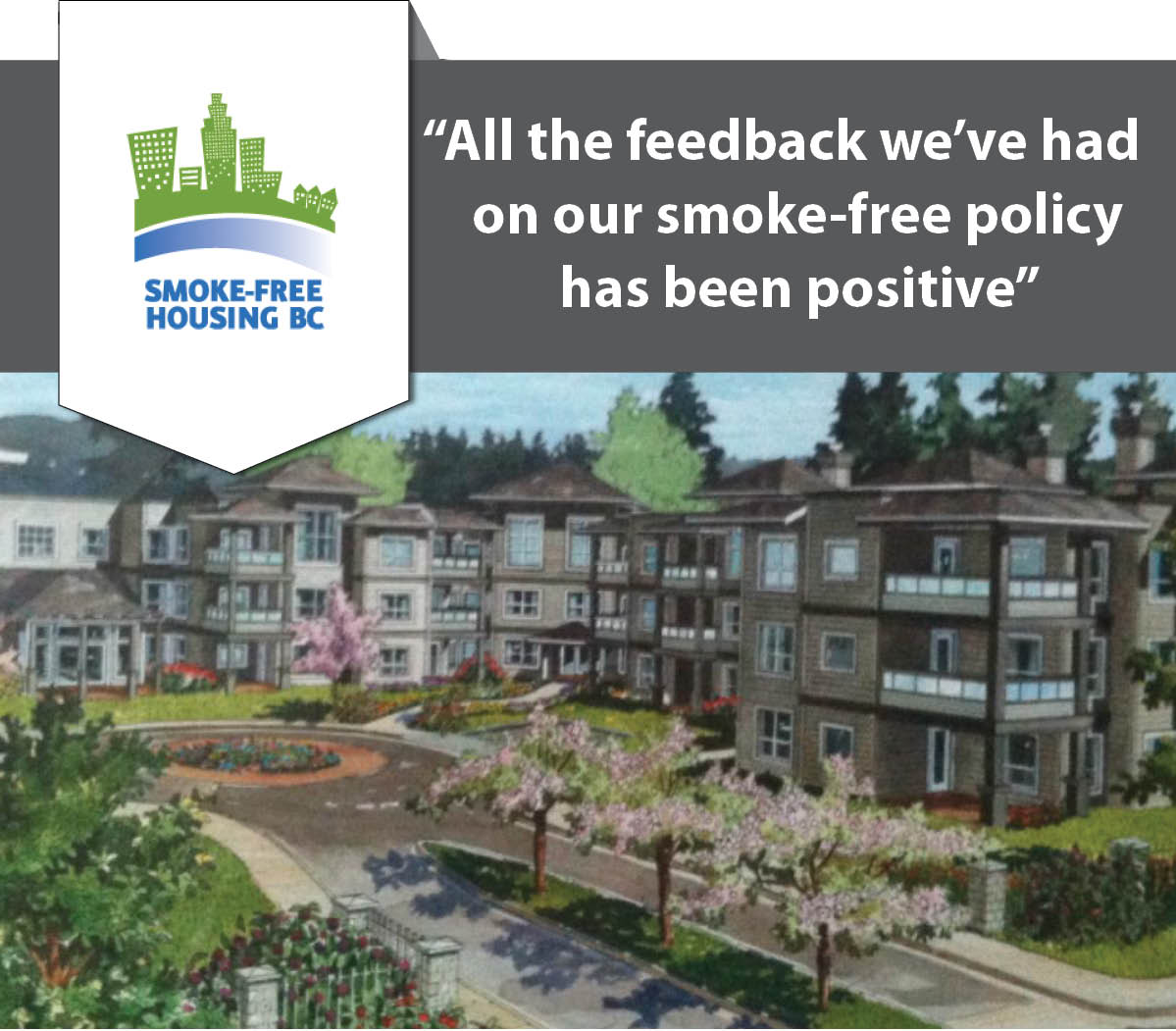
Prince George developer goes 100% smoke-free from the get go for marketing advantage
Kim Croft's Story
Magnolia Gardens on the Park is a new condo development in Prince George. Kim Croft and her husband have taken bold steps to ensure every unit they sell is smoke-free.

Prince George developer goes 100% smoke-free from the get go for marketing advantage
Kim Croft's Story
Magnolia Gardens on the Park is a new condo development in Prince George. Kim Croft and her husband have taken bold steps to ensure every unit they sell is smoke-free.
“We’ve never been smokers, and overall live a pretty clean and healthy lifestyle. Why wouldn’t we want to promote similar behaviour in our development business?” asked Croft.
“We’ve never been smokers, and overall live a pretty clean and healthy lifestyle. Why wouldn’t we want to promote similar behaviour in our development business?” asked Croft.
Magnolia Gardens is a new development being built alongside a pre-existing building in Prince George. Although the current units are overseen by a Strata Council, Croft is ensuring that the new units being built are exclusively smoke-free.
“We’ve already had some interest,” said Croft. “One woman called and specifically asked if the units were smoke-free. It felt great to be able to assure her they are.”
“So far, all feedback we’ve had on our smoke-free policy has been positive,” continued Croft.
“Our main motivation to promote a smoke-free environment is to encourage better health for everyone,” explained Croft. “However, the fringe benefits of higher resale costs and lower maintenance fees are a definite added bonus.”
According to health advocates the BC Lung Association and the Heart and Stroke Foundation, smoke-free condos are gaining momentum as more and more families what to live in 100% smoke-free environments. According to a recent survey of BC Real Estate Agents, condo owners that smoke will have a more difficult time selling their property, and will get less money for their property as well.
“Our survey findings suggest that in addition to undermining health, homeowners who smoke are burning a hole in their pocketbook,” said Scott McDonald, CEO of the BC Lung Association.
Smoking can significantly impact the desirability of a property for prospective buyers. It stains the walls and ceilings and leaves an odour that can be almost impossible to eliminate.
Seventy per cent of British Columbia REALTORS® believe that most prospective buyers are less likely or unwilling to purchase a home where the owners have smoked.
But even if the people selling the condo don’t smoke – if their neighbours smoke and there’s a smell of smoke in the building - it can also have a negative impact on property values. Aaron Jasper, a REALTOR® with Klein Group, said he was worried about selling his own condo in the West End a few years ago due to a neighbour who smoked. “We’d be coming down the hall, and when they would smell the cigarette smoke, they’d lose interest without even having seen the suite.”
Over half of BC REALTORS® surveyed say a property’s value is decreased by as much as 10 percent if the previous owners allowed smoking in the home.
Jack Boomer, spokesperson for SmokeFreeHousingBC.ca, an online resource for smoke-free multi-unit housing advocates, said, “This dispels the common myth among strata owners that adopting a no-smoking bylaw could negatively impact resale values. In fact, these survey results show that nothing could be further from the truth, and that it pays to adopt a no-smoking bylaw.”
According to the Canadian Tobacco, Alcohol and Drugs Survey, the BC Smoking rate is 11.4 percent, the lowest rate in the country. Read the full News release of the survey results here.
Magnolia Gardens is a new development being built alongside a pre-existing building in Prince George. Although the current units are overseen by a Strata Council, Croft is ensuring that the new units being built are exclusively smoke-free.
“We’ve already had some interest,” said Croft. “One woman called and specifically asked if the units were smoke-free. It felt great to be able to assure her they are.”
“So far, all feedback we’ve had on our smoke-free policy has been positive,” continued Croft.
“Our main motivation to promote a smoke-free environment is to encourage better health for everyone,” explained Croft. “However, the fringe benefits of higher resale costs and lower maintenance fees are a definite added bonus.”

REALTOR® knows clients don't want homes that smell of smoke
Toni's Story
According to a recent survey of BC REALTORS® commissioned by the Heart and Stroke Foundation and the BC Lung Association, almost 6 in 10 agree that most buyers are less likely to buy a home where people have smoked, and 12 percent went even further and said most buyers are actually unwilling to buy a smokers’ home.

REALTOR® knows clients don't want homes that smell of smoke
Toni's Story
According to a recent survey of BC REALTORS® commissioned by the Heart and Stroke Foundation and the BC Lung Association, almost 6 in 10 agree that most buyers are less likely to buy a home where people have smoked, and 12 percent went even further and said most buyers are actually unwilling to buy a smokers’ home.
Toni Pohl agrees. A REALTOR® with Sutton Group, Pohl says the smell of smoke in the building can have a real impact on the desirability of individual units. “If it's a condo and my clients walk into the building and down the hallway to get to the unit - and smell smoke - they’d say 'I don't want to walk past this smell everyday to get home.' It often stops them in their tracks." said Pohl.
“And once we enter a unit where the current owners are smokers, instead of talking decorations/renovations – we’re talking smell, whether it can be removed from the walls, the costs of removing the smell.” Added Pohl. “I hear things like, "It just feels dirty...... Not what I was hoping for when I buy a new home - especially at these prices!”
According to Pohl, "buying a condo that smells of smoke is like like buying into someone's history - the worst of their history - and there's no escaping it.”
Toni Pohl agrees. A REALTOR® with Sutton Group, Pohl says the smell of smoke in the building can have a real impact on the desirability of individual units. “If it's a condo and my clients walk into the building and down the hallway to get to the unit - and smell smoke - they’d say 'I don't want to walk past this smell everyday to get home.' It often stops them in their tracks." said Pohl.
“And once we enter a unit where the current owners are smokers, instead of talking decorations/renovations – we’re talking smell, whether it can be removed from the walls, the costs of removing the smell.” Added Pohl. “I hear things like, "It just feels dirty...... Not what I was hoping for when I buy a new home - especially at these prices!”
According to Pohl, "buying a condo that smells of smoke is like like buying into someone's history - the worst of their history - and there's no escaping it.”
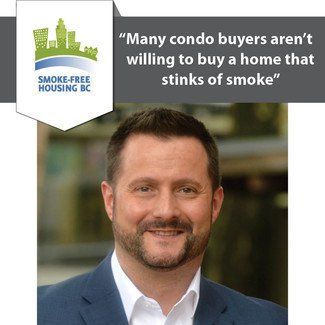
REALTOR® gives his clients the ugly truth about smoking in condos
Aaron Jasper's Story
If you’re trying to sell your condo and have smoked in the home - you might have a harder time selling it, and you’re also likely to get less money from the sale, according to a new survey of BC REALTORS®.
Sellers need to be aware that while there’s a hot housing market in BC, many condo buyers aren’t willing to buy a home that stinks of smoke. “The next time I’m sitting down with a client who happens to smoke, and he/she asks how much they can get for the place, I’ll be giving them the ugly truth - that because of the smoke, there’s a good chance they’ll get a lower price.” said Aaron Jasper, a REALTOR® with Klein Group.

REALTOR® gives his clients the ugly truth about smoking in condos
Aaron Jasper's Story
If you’re trying to sell your condo and have smoked in the home - you might have a harder time selling it, and you’re also likely to get less money from the sale, according to a new survey of BC REALTORS®.
Sellers need to be aware that while there’s a hot housing market in BC, many condo buyers aren’t willing to buy a home that stinks of smoke. “The next time I’m sitting down with a client who happens to smoke, and he/she asks how much they can get for the place, I’ll be giving them the ugly truth - that because of the smoke, there’s a good chance they’ll get a lower price.” said Aaron Jasper, a REALTOR® with Klein Group.
The Clean Air Coalition of BC recently commissioned a survey of 200 BC REALTORS® on the impact of smoking in the home. The survey found that smoking in the home can actually deter prospective buyers. While close to six of 10 REALTORS® said most buyers are less likely to buy a home where people have smoked - 12 percent went even further and said most buyers are actually unwilling to buy a smokers’ home.
But even if people selling the condo don’t smoke – if their neighbours smoke and there’s a smell of smoke in the building - it can also have a negative impact on selling the unit. Jasper said he was worried about selling his own condo in the West End a few years ago due to a neighbour who smoked. “We’d be coming down the hall, and when they would smell the cigarette smoke, they’d lose interest without even having seen the suite.”
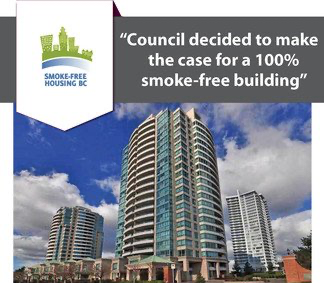
Condo tower bans smoking altogether: A rising trend
Gudrun Howards's Story
“Nothing else worked,” says Strata Council President Gudrun Howard speaking about her building’s choice to become 100% smoke‐free.
“We only rarely get second‐hand smoke complaints now, and if we do, having a 100% no‐smoking bylaw gives the Strata power to act,” continues Howard.

Condo tower bans smoking altogether: A rising trend
Gudrun Howards's Story
“Nothing else worked,” says Strata Council President Gudrun Howard speaking about her building’s choice to become 100% smoke‐free.
“We only rarely get second‐hand smoke complaints now, and if we do, having a 100% no‐smoking bylaw gives the Strata power to act,” continues Howard.
Howard is referring to Gemini II, an 11‐year‐old, 135‐suite condo tower in Burnaby where she owns a condo and has served on Strata Council for years.
Howard is referring to Gemini II, an 11‐year‐old, 135‐suite condo tower in Burnaby where she owns a condo and has served on Strata Council for years.
Howard recalls firsthand the many years of smoking complaints, “At first we thought our problems were largely due to people smoking on their balconies. So, after a failed attempt the previous year, owners approved a smoking ban on limited common properties (balconies) in 2008. Unfortunately while it helped, it didn't solve the problem.”
“Next, we spoke directly with the owners whose smoking was the cause of complaints, but this only resulted in a temporary reduction in amount of hallway smoke,” she continued. “In addition, we sent warning letters, assessed fines and explored ways to help clear the air of smoke, encouraging the use of air purifiers and in one case even offering to provide an air purifier for an owner. Sadly, that didn't make much difference either.”
“Certainly our biggest hurdle was our building’s ventilation system. It works by drawing stale air out of owner suites, into common hallways. Understandably, if an owner smokes, their cigarette smoke and smells fast become everyone’s problem,” explained Howard.
“I remember the smell being so strong on one floor it impacted an owner's ability to effectively market and sell their suite. During Open Houses, potential buyers would arrive, step out of the elevator only to turn right back around they were so turned off,” she continued.
“One owner on the floor in question took to wearing a mask to protect herself every time she left her unit. Luckily, it was about this time I spotted a newspaper article about a Lower Mainland Strata which was sued by an owner for failing to protect him/her from second‐hand smoke. The ruling agreed with the plaintiff that second‐ hand smoke issues ultimately compromised the owner’s health and that the Strata Corporation was liable in this case.”
“I was concerned despite our best attempts, we could one day be similarly sued, so Council decided to make the case for a 100% smoke‐free building – and in September 2012, our resolution was approved,” said Howard.
On reflection, she believes it was important for the Strata Council to demonstrate the many strategies it had attempted to resolve the problem before proposing smoking be banned entirely – including translating Strata notices into Chinese for the benefit of many Chinese‐speaking owners, “By the time we tabled a 100% no smoking bylaw, owners understood we had tried everything and that there was no other alternative.”
“We regularly receive calls from property managers and residents looking for help to address second‐hand smoke,” says Sharon Hammond, Manager of smokefreehousingbc.ca a valuable resource for Strata Corporations exploring the idea of going smoke‐free.
“Not everyone knows it’s legal to adopt a 100% no smoking bylaw. We want to promote smoke‐free building success stories, like the Gemini II, to educate strata corporations on the growing number of buildings becoming 100% smoke‐free.
Plus, we want to get the word out that while smoke‐free buildings protect residents from a known health hazard, they can also increase marketability, reduce conflicts among residents, protect against litigation and human rights complaints, save money on maintenance and eliminate a leading cause of residential fires. It’s win‐win. What’s good for resident health is also good for the bottom line.”
Howard recalls firsthand the many years of smoking complaints, “At first we thought our problems were largely due to people smoking on their balconies. So, after a failed attempt the previous year, owners approved a smoking ban on limited common properties (balconies) in 2008. Unfortunately while it helped, it didn't solve the problem.”
“Next, we spoke directly with the owners whose smoking was the cause of complaints, but this only resulted in a temporary reduction in amount of hallway smoke,” she continued. “In addition, we sent warning letters, assessed fines and explored ways to help clear the air of smoke, encouraging the use of air purifiers and in one case even offering to provide an air purifier for an owner. Sadly, that didn't make much difference either.”
“Certainly our biggest hurdle was our building’s ventilation system. It works by drawing stale air out of owner suites, into common hallways. Understandably, if an owner smokes, their cigarette smoke and smells fast become everyone’s problem,” explained Howard.
“I remember the smell being so strong on one floor it impacted an owner's ability to effectively market and sell their suite. During Open Houses, potential buyers would arrive, step out of the elevator only to turn right back around they were so turned off,” she continued.
“One owner on the floor in question took to wearing a mask to protect herself every time she left her unit. Luckily, it was about this time I spotted a newspaper article about a Lower Mainland Strata which was sued by an owner for failing to protect him/her from second‐hand smoke. The ruling agreed with the plaintiff that second‐ hand smoke issues ultimately compromised the owner’s health and that the Strata Corporation was liable in this case.”
“I was concerned despite our best attempts, we could one day be similarly sued, so Council decided to make the case for a 100% smoke‐free building – and in September 2012, our resolution was approved,” said Howard.
On reflection, she believes it was important for the Strata Council to demonstrate the many strategies it had attempted to resolve the problem before proposing smoking be banned entirely – including translating Strata notices into Chinese for the benefit of many Chinese‐speaking owners, “By the time we tabled a 100% no smoking bylaw, owners understood we had tried everything and that there was no other alternative.”
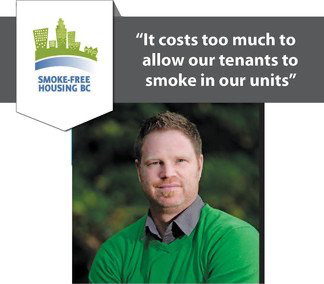
Powell River Property Manager converts rental properties to 100% smoke-free for cost savings
Chris Carlos' Story
“It’s nice to say it’s a health issue, but really it comes down to maintenance costs,” explained Chris Carlos, Property Manager for RE/MAX Property Management in Powell River.

Powell River Property Manager converts rental properties to 100% smoke-free for cost savings
Chris Carlos' Story
“It’s nice to say it’s a health issue, but really it comes down to maintenance costs,” explained Chris Carlos, Property Manager for RE/MAX Property Management in Powell River.
Carlos is referring to his decision to make all rental units completely smoke-free. “It’s a clause that we include in our rental agreements; tenants need to agree to this before we sign a lease with them,” said Carlos.
Carlos is referring to his decision to make all rental units completely smoke-free. “It’s a clause that we include in our rental agreements; tenants need to agree to this before we sign a lease with them,” said Carlos.
“We’ve had potential tenants walk away because of the lingering smoke smell. You can clean the carpets and repaint the walls, but it’s hard to get the smoke smell to leave completely,” continued Carlos.
The landlords owning the rental properties that Carlos manages are on board. “Once you explain not only the health benefits associated with going smoke-free, but also the maintenance costs that will be saved, it’s hard for them not to agree with it,” said Carlos.
“At the end of the day, it just comes down to costs; it costs too much to allow tenants to smoke in our units,” explained Carlos.
According to health advocates the BC Lung Association and the Heart and Stroke Foundation, smoke-free apartments are gaining momentum as more and more families want to live in 100% smoke-free environments. In fact, a 2013 Angus Reid survey of 833 residents living in multi-unit dwellings, confirmed that nearly two thirds of residents prefer to live in a building that is completely smoke-free [1].
Hugh Turner, a landlord in Victoria who owns multiple apartment buildings, switched all his buildings to smoke-free status six years ago when he learned it was legal to do. “It’s good for tenants and it’s good for our bottom line. Plus it was easy to do.” Like many landlords in BC, Turner recognized the huge demand for smoke-free housing, as well as the obvious cost savings, and hasn’t looked back.
Proactive landlords who have made the switch to smoke-free buildings are simply finding the benefits too great to ignore:
- Saves you money by reducing cleaning, repair and maintenance costs
- Reduces complaints from tenants: 50% of residents living in multi-unit dwellings have experienced smoke infiltrating their homes from neighbouring units. [2]
- Reduces the risk of fires: Tobacco materials are the #1 source of fatal residential fires in BC.
- Offers a safer, healthier and cleaner indoor environment for residents.
- Protects against litigation by tenants seeking relief from disabilities aggravated by second-hand smoke.
- Is non-discriminatory. They don’t exclude people who smoke, but simply require that they comply with the no-smoking policy.
“British Columbians are used to smoke-free environments at work, in restaurants and bars, in public places, as well as outdoor parks and beaches. And we want the same protections in our homes.” said Scott McDonald, CEO of the BC Lung Association.
Once landlords go smoke-free they’re hooked – on the benefits that is. “It’s one of the easiest things you can do to protect your investment, reduce fires and clean-up costs, protect resident health, and reduce complaints of second-hand smoke from frustrated tenants.” says Tyler Davis, Property Manager, Vancouver Management Ltd.
According to the Canadian Tobacco, Alcohol and Drugs Survey, the BC Smoking rate is 11.4 percent, the lowest rate in the country. If landlords are concerned about vacancies, look to this growing population of prospective tenants who view smoke-free homes as an attractive and non-negotiable amenity.
“We’ve had potential tenants walk away because of the lingering smoke smell. You can clean the carpets and repaint the walls, but it’s hard to get the smoke smell to leave completely,” continued Carlos.
The landlords owning the rental properties that Carlos manages are on board. “Once you explain not only the health benefits associated with going smoke-free, but also the maintenance costs that will be saved, it’s hard for them not to agree with it,” said Carlos. “At the end of the day, it just comes down to costs; it costs too much to allow tenants to smoke in our units,” explained Carlos.
Hugh Turner, a landlord in Victoria who owns multiple apartment buildings, switched all his buildings to smoke-free status six years ago when he learned it was legal to do. “It’s good for tenants and it’s good for our bottom line. Plus it was easy to do.” Like many landlords in BC, Turner recognized the huge demand for smoke-free housing, as well as the obvious cost savings, and hasn’t looked back.
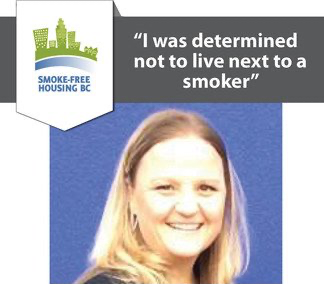
BC townhome buyer gives up on purchasing new home to avoid living next door to a smoker
Valerie Maundrell's Story
“I was determined not to live next to a smoker,” said Valerie Maundrell, a homeowner in South Surrey, BC, “so much so that my husband and I let go of an accepted offer on a beautiful new townhome when we found out a smoker lived next door.”

BC townhome buyer gives up on purchasing new home to avoid living next door to a smoker
Valerie Maundrell's Story
“I was determined not to live next to a smoker,” said Valerie Maundrell, a homeowner in South Surrey, BC, “so much so that my husband and I let go of an accepted offer on a beautiful new townhome when we found out a smoker lived next door.”
Maundrell does not suffer from a breathing condition, nor has she any young children with young lungs to protect; she simply wants to live to healthy life. For her that includes minimizing exposure to harmful second-hand smoke.
Maundrell does not suffer from a breathing condition, nor has she any young children with young lungs to protect; she simply wants to live to healthy life. For her that includes minimizing exposure to harmful second-hand smoke.
“My husband and I ended up buying a pre-construction townhome and crossed our fingers that our new neighbours would be non-smokers. Fortunately, we got lucky,” continued Maundrell.
“But while second-hand smoke is not a problem for us, another owner in our townhouse complex is suffering as a result of a next door neighbour who smokes.
“The good news is that my husband sits on our Strata Council. In addition to lobbying the Strata Council, I’m working to educate my neighbours about second-hand smoke and seek support for making our complex 100 percent smoke-free inside and out. So far support is strong, but we’ll need to get a ¾ vote of owners for the new bylaw to pass,” says Maundrell.
Maundrell looks forward to the day when the status quo is that all multi-unit housing is automatically 100 percent smoke-free, and that if Strata Councils want to allow smoking, they’ll need to change their bylaws – not the other way around as it is today.
“Now that I’m a new townhome owner, I’ve been looking into strata bylaws and smoking rules. I truly didn’t realize how much of a problem it can be to resolve smoking problems, and at the same time how easy it is for owners to come to an agreement and make a building smoke-free. I don’t get why more people aren’t doing it. Most people I know are non-smokers and want to breathe clean air."
According to health advocates the BC Lung Association and the Heart and Stroke Foundation, owners who smoke in the home may in future face more than complaints from their non-smoking neighbours.
The results of a 2015 survey of BC REALTORS® suggest that when they want to sell, they may also have a harder time selling, and get less money for their property as well. Read the full news release of the survey results here.
“My husband and I ended up buying a pre-construction townhome and crossed our fingers that our new neighbours would be non-smokers. Fortunately, we got lucky,” continued Maundrell.
“But while second-hand smoke is not a problem for us, another owner in our townhouse complex is suffering as a result of a next door neighbour who smokes.
“The good news is that my husband sits on our Strata Council. In addition to lobbying the Strata Council, I’m working to educate my neighbours about second-hand smoke and seek support for making our complex 100 percent smoke-free inside and out. So far support is strong, but we’ll need to get a ¾ vote of owners for the new bylaw to pass,” says Maundrell.
Maundrell looks forward to the day when the status quo is that all multi-unit housing is automatically 100 percent smoke-free, and that if Strata Councils want to allow smoking, they’ll need to change their bylaws – not the other way around as it is today.
“Now that I’m a new townhome owner, I’ve been looking into strata bylaws and smoking rules. I truly didn’t realize how much of a problem it can be to resolve smoking problems, and at the same time how easy it is for owners to come to an agreement and make a building smoke-free. I don’t get why more people aren’t doing it. Most people I know are non-smokers and want to breathe clean air."
Site last updated — November 20, 2023

™ The heart and / Icon on its own and the heart and / Icon followed by another icon or words are trademarks of the Heart and Stroke Foundation of Canada.

